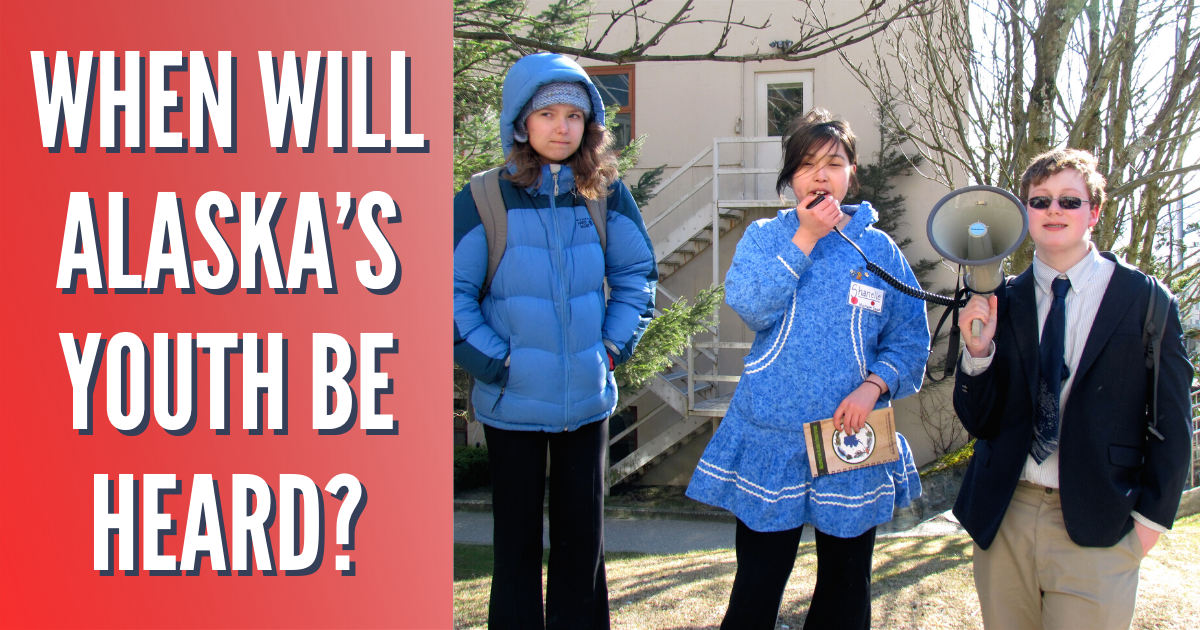Young people across Alaska are bewildered. We are scared, exhausted and furious. We have watched with frustration and deep anxiety as our state government continues to put fossil fuels above our futures, actively making the climate crisis worse and inducing devastating harms like melting permafrost, worsening wildfires, coastal erosion, and loss of sea and river ice.
For more than two decades, we, alongside many other young people in Alaska, have been fighting for the health, safety and sustainable ways of life of our villages and cities in the halls of our government. Through the Alaska Youth for Environmental Action (AYEA) program, young Alaskans like us have been working tirelessly for climate justice.
Since AYEA’s founding in 1998, thousands of Alaska youths have engaged in efforts urging Alaska’s political branches to stop actively contributing to the growing climate crisis through policies, protections of our sacred lands and waters, and more. In 2005, youths collected 5,000 signatures in support of climate action from teenagers in 150 Alaska villages and cities. In 2017, teens petitioned the state to reduce Alaska’s fossil fuel emissions. In 2019 and 2020, young Alaskans held climate strikes across the state, joining more than four million other young people around the globe and demanding a transition to 100% renewable clean energy. In 2021, we met with Alaska’s leadership, asking for legislation to transition off of fossil fuels. Again and again, Alaska youth have urged our government to change course and treat the climate crisis like the emergency that it is. Despite these efforts over the years, the government of Alaska continues to put fossil fuels above our right to a liveable climate.
We are in a critical moment to protect our rights as young people to a safe climate in Alaska, and we cannot afford to wait any longer.
On Feb. 25, the Alaska Supreme Court denied a petition for a rehearing of the youth-led constitutional climate case, Sagoonick v. State of Alaska. Brought by 16 young Alaskans, the youth plaintiffs’ case challenged the state’s policies that promote fossil fuels for causing Alaska’s climate crisis and endangering our health, safety, communities, cultures and overall futures as Alaskans.
On Jan. 28, in a split decision, the Alaska Supreme Court shut the courthouse doors on these young Alaskans with three of the five justices ruling that the courts could not even hear evidence of how they have been harmed by the actions of their own government.
The majority also said that Alaska’s government had already considered the youths’ concerns when they met with AYEA in 2017 and encouraged us to continue advocating our cause to the executive and legislative branches. But today, the question still remains of what that meeting achieved and what actions were taken to demonstrate that the state of Alaska cares about what its young people have to say. Did our government reverse course and stop contributing to the climate crisis that threatens our very futures? Did they end their policies that actively cause us harm? No, instead it was all decidedly shallow lip service. It is clearer now more than ever that the legislative and executive branches will continue putting fossil fuels over our lives if the third branch of government -- our courts -- won’t even allow youths through the courthouse doors. It is the duty of our courts to protect our rights, but first they have to hear our claims.
But there is still hope. Two of the justices in the case dissented, and had even just one other justice joined them, the court would have established a constitutional right to a livable climate.
The dissent shows that the tide of climate justice in Alaska’s courts is turning, but first we need Alaska’s courts to open their doors to us now. With the Legislature and the executive branch continuing to make the climate crisis worse every day, we have no choice but to keep fighting in the courts to secure constitutional protection. Only the judicial branch can protect our rights. Our legal fight for climate justice is not over, but the question remains: when will Alaska’s courts allow our voices to be heard?
Shanelle Afcan is an AYEA graduate from Nunam Iqua
Cassidy Austin-Merlino is an AYEA graduate from McCarthy
AYEA is a program of The Alaska Center Education Fund.
Share this Post

